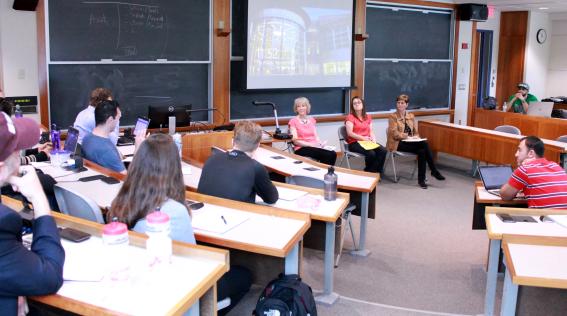MBA Faculty Panel Addresses Gender Equity and Inclusion
November 13, 2015

A recent Business Week survey, added Smircich, noted that male and female MBA graduates begin their careers with roughly the same salaries, but five to seven years down the road a widening gap leaves women with 80% of the earning power of their male counterparts.
The media drives sports programming and advertising, which skew toward male versus female athletes and attractive versus less attractive female athletes, remarked Janet Fink. To the contrary, the Isenberg professor has conducted product endorsement studies that demonstrate that focusing on a female athlete’s skills sells better than her looks.
But the media, she continued, is male dominated—95% of sports editors are men. Women athletes receive a scant .5% of sponsorship dollars. Women likewise capture 2% of ESPN’s airtime and 3% of airtime on all sports news shows. Still, said Fink, there is progress, like airing by Fox of every women’s world cup soccer game and the U.S. women team’s status as TV’s highest-rated soccer team in U.S. history.
Gender-Biased Micropractices Revealed
The challenge for achieving gender equality in the workplace cuts deeper than creating a gender-blind pipeline for talent, insisted Smircich. It involves transforming [often] below-the-surface “micropractices of interaction” like gender-based likeability biases and notions that competent women may appear less than warm. Such practices, she said, include whom we have lunch with, she told the students. “Since I joined Isenberg last summer, I’ve been asked by six male colleagues to play golf,” remarked Melton, an experienced golfer. Another female coworker who is a swimmer, has received no such overtures, she said.
“As a woman, you’re not a boss but bossy,” remarked an MBA student. “People considered me aggressive.” Men do get more of a pass on emotional behavior like excitability, responded Fink. The bottom line, she continued, is that “women feel tremendous pressure; they are always thinking before they talk. “That’s extra work you have to do—the job of self-monitoring,” observed Smircich. And the higher you go in an organization, the harder things get. That’s because there are fewer objective criteria for interactions with an organization’s elite.
Melton believes that her own research is making a difference. “Some of my work looks at workplace allies and advocates,” she told the students. To that end, she aspires to distill “positive modeling. . . that empowers women to improve their self-advocacy skills and mobility.”